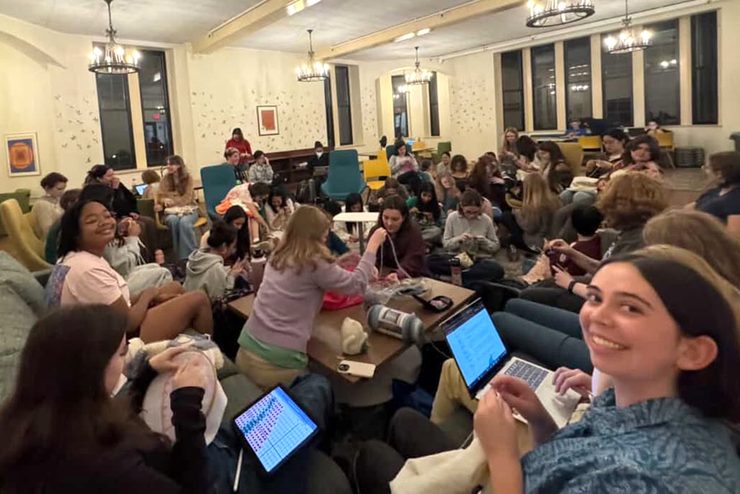From crocheting tote bags to socializing with friends over a game of poker, Wellesley students can find community away from their screens in a variety of ways.
Knitty Committee, for example, is a fiber arts club dedicated to craft-making in a fun and inclusive environment. “Every week we have ice breakers, where we get to hear from every single member,” says Kiera Loffredo ’26, co-president of the club. “It’s a great way to make sure everyone knows each other.”
Knitty Committee members specialize in sewing, crocheting, knitting, and various other crafts, but it’s a beginner-friendly group that requires no experience, which Loffredo greatly appreciates. “I personally didn’t know how to crochet three years ago,” she says, attributing her newfound skills to the “knowledge and support” of the group. “We are always so excited to see each other’s work, progress, mess-ups, and just each other!” (Look for their more successful projects in December at the annual Community Craft Fair, where the Wellesley community buys and sells handmade crafts, from jewelry to postcards.)
Some students interested in offline activities turn to analog games. Members of the Dungeons & Dragons Club harness their imaginations to create epic stories over tabletops, and they offer “D&D 101” sessions to introduce would-be players and dungeon masters to the basics of the game. Another classic pursuit is cards. Rebecca Birnbach ’26 plays low-stakes poker weekly with both familiar and new faces. “Our meetings help break up the ordinary monotony of the school week,” Birnbach says, and they allow the group to have fun together and socialize. As the players are all relatively new to the game, Birnbach values “learning and developing a new skill” surrounded by her friends, and she has expressed an increased comfort in learning poker outside of a male-centric environment. “We’ve all discussed this, and appreciate what a refreshing change it is,” she says.

Birnbach says this newfound collective interest in poker has introduced her to “so many people” she might not have met if not for the club: “It’s been an excellent opportunity to put names to all the smiling faces I see on campus!”
In one case, what started as a craft project turned into an analog activity that included over 90 different organizations. During her final spring semester at Wellesley, Gabriella Olavarria ’25 collaborated with 90 organizations on campus to create a quilt celebrating the College community. “It was such an amazing way to meet so many different individuals I would not have met otherwise,” Olavarria says. She wanted to create “a quilted project to leave behind” that engaged various campus clubs and groups. The project was rooted in her passion for quilting, a practice she learned from her grandmother. “I love the creativity and utility that comes with quilt making,” Olavarria says.
Quilting also provided a way for her to connect with others. “My invitation to the community [to become part of the] quilt had a chain reaction,” Olavarria says. Students who contributed a square to the quilt would pass the word on to their friends, who then signed up to design their own squares. News of the quilt made it all the way to Wellesley College Senate, she says, “which was really cool to hear about!”
For students who are interested in experimenting with offline activities but aren’t sure where to begin, the Office of Student Wellness offers a variety of options. During the Winter Wellness Fair, for example, students can make snowglobes that provide a “visualization” for shaking the snow globe to represent their minds. “We encourage students to imagine their thoughts calming as the snow settles, and we like to weave an educational component into these fun activities we do,” says Allison Weinberg, director of student wellness.
Weinberg says engaging in analog activities is an essential component of belonging in community. It helps students connect with one another, and it also promotes well-being. “When I think about analog, it’s about putting down a virtual space and connecting and sitting with others, and certainly with our furry friends during our therapy dogs program, to engage and calm our nervous system,” she says. “These kinds of tactile activities allow us to share in organic ways that you can’t have through a screen.”
